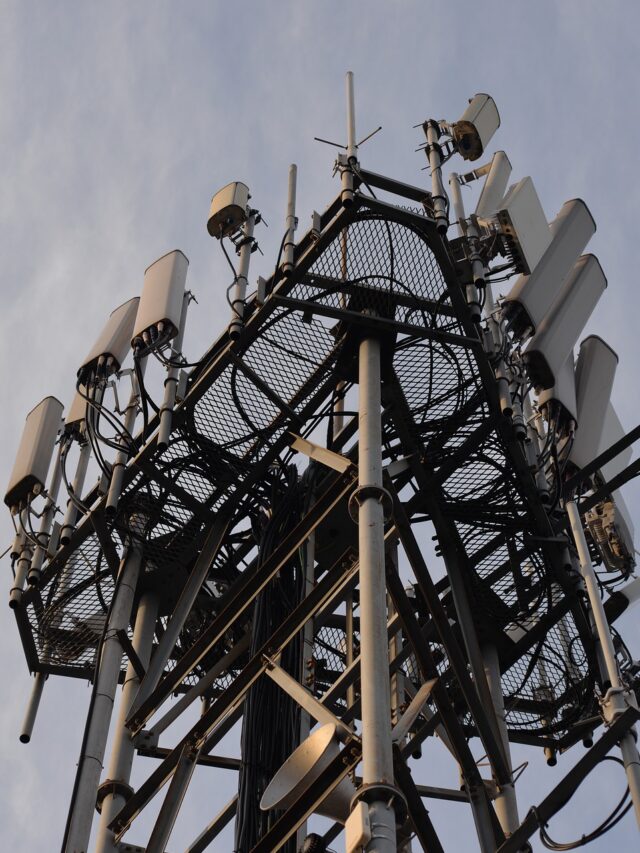TunnelBear VPN fast factsOur rating: 3.1 stars out of 5
|
TunnelBear’s unique, bear-themed approach to its VPN service sets it apart from the more technical and standardized implementations of other VPNs. TunnelBear is available on Windows, Mac, iOS, Android, Chrome, Firefox, and Edge. It offers 5,000+ servers, unlimited device connections, and a subscription option for teams and organizations.
Despite its fun design and accessibility, TunnelBear’s slower speeds and buggy app are causes for concern. In addition, its server fleet only spans 47 countries.
Semperis
Employees per Company Size
Micro (0-49), Small (50-249), Medium (250-999), Large (1,000-4,999), Enterprise (5,000+)
Enterprise (5,000+ Employees), Large (1,000-4,999 Employees)
Enterprise, Large
Features
Advanced Attacks Detection, Advanced Automation, Anywhere Recovery, and more
ESET PROTECT Advanced
Employees per Company Size
Micro (0-49), Small (50-249), Medium (250-999), Large (1,000-4,999), Enterprise (5,000+)
Any Company Size
Any Company Size
Features
Advanced Threat Defense, Full Disk Encryption , Modern Endpoint Protection, and more
ManageEngine Log360
Employees per Company Size
Micro (0-49), Small (50-249), Medium (250-999), Large (1,000-4,999), Enterprise (5,000+)
Micro (0-49 Employees), Medium (250-999 Employees), Enterprise (5,000+ Employees), Large (1,000-4,999 Employees), Small (50-249 Employees)
Micro, Medium, Enterprise, Large, Small
Features
Activity Monitoring, Blacklisting, Dashboard, and more
How much does TunnelBear VPN cost?
TunnelBear’s starting paid plan costs $3.33 per month via its TunnelBear Unlimited. It has three subscription tiers: Free, Unlimited, and Teams. Only TunnelBear Unlimited has the option to choose between a monthly, one-year, and three-year subscription.
| Plan | TunnelBear Free | TunnelBear Unlimited | TunnelBear Teams |
|---|---|---|---|
| 1 year | Free | $3.33 per month (billed $39.99 for the first year) | $5.75 per user, per month |
| 3 years | Free | $3.33 ($120 billed once) | N/A |
| Monthly | Free | $9.99 per month | N/A |
| Feature differences |
|
|
Interestingly, the monthly and three-year plans are only available to view after you click the “Get started” button for TunnelBear Unlimited subscription option priced at $3.33. Personally, I hope TunnelBear makes their additional contract options more accessible to view or at least have it at the top of its pricing page.
In terms of individual pricing, TunnelBear’s Unlimited subscription is at a discounted rate of $3.33 per month for the one-year plan. If you opt for the TunnelBear Unlimited paid plan, this discounted annual rate is a steal. However, because this is a sale offer, prices may vary in the future.
I would suggest trying TunnelBear’s free version before purchasing a subscription. While data is capped at 2GB and some features are omitted, the free version allows you to get a feel for TunnelBear’s desktop VPN implementation.
For business owners, TunnelBear Teams is a practical option. You get all of TunnelBear’s paid features in addition to more team-based add-ons, such as centralized billing and account manager tools.
Does TunnelBear VPN have a free version?
Yes, TunnelBear has a dedicated free version of its VPN. Those interested in trying the service don’t have to worry about providing payment information, as you can easily download it with no strings attached.
However, there are notable limitations with TunnelBear VPN’s free version compared to its paid plan. The free version has a 2GB data cap that resets every month. So, realistically speaking, free users will only be able to try out the VPN for around a day or two before data runs out.
In addition, only paid users will be able to select city-designated servers on TunnelBear’s network. Free users are only able to choose from available countries (Figure A).
Figure A
Despite this, TunnelBear states that their free and paid versions don’t have any difference performance-wise, making the free version a viable way to test if the VPN is right for you.
SEE: TunnelBear VPN Free vs Paid: Which Plan Is Right for You? (TechRepublic)
Security and privacy: Is TunnelBear VPN secure?
Specs-wise, TunnelBear has all the requisites needed for a modern VPN to be considered secure. It has OpenVPN, WireGuard, and IKEv2 — the three industry-standard security protocols we want in a VPN. It also utilizes AES 256 encryption, includes a kill switch (VigilantBear), and split tunneling (SplitBear).
TunnelBear has a no-logs policy, which states that it doesn’t collect any user’s browsing information, IP addresses, DNS queries, and applications used while connected to the VPN.
TunnelBear also has an impressive track record of undergoing annual independent testing. Since 2016, TunnelBear has completed seven annual independent security audits. The most recent third-party audit was done in October 2023 by Cure53.
In that 2023 audit, Cure53 found a total of “13 issues this year, with only 7 considered to be of medium risk or higher.” Fortunately, TunnelBear has said that “12 out of the 13 identified issues have been fixed or mitigated.” Personally, I give major props to the TunnelBear team for continuing to have its VPN tested via third-party audits. This shows a strong commitment to transparency and is a great way to build trust among its users.
On the flip side, some people may be wary of TunnelBear being based in Canada, one of the members of the Five Eyes intelligence alliance, along with Australia, New Zealand, the U.K., and the U.S. If government intervention is something you’re trying to avoid, TunnelBear may not be for you.
Overall, TunnelBear’s security features, transparency, and annual independent testing make it a secure and trustworthy VPN in 2024.
Key features of TunnelBear VPN
TunnelBear has a few key features that set it apart from other VPNs. Let’s check out four in particular that you should know about.
Beginner-friendly interface
Compared to other VPNs, TunnelBear has a very user-friendly, bear-themed interface. Servers are represented by tunnels, and when you connect or switch to a new tunnel, a bear will pop up (Figure B) from inside the tunnel — hence the name, TunnelBear.
Figure B
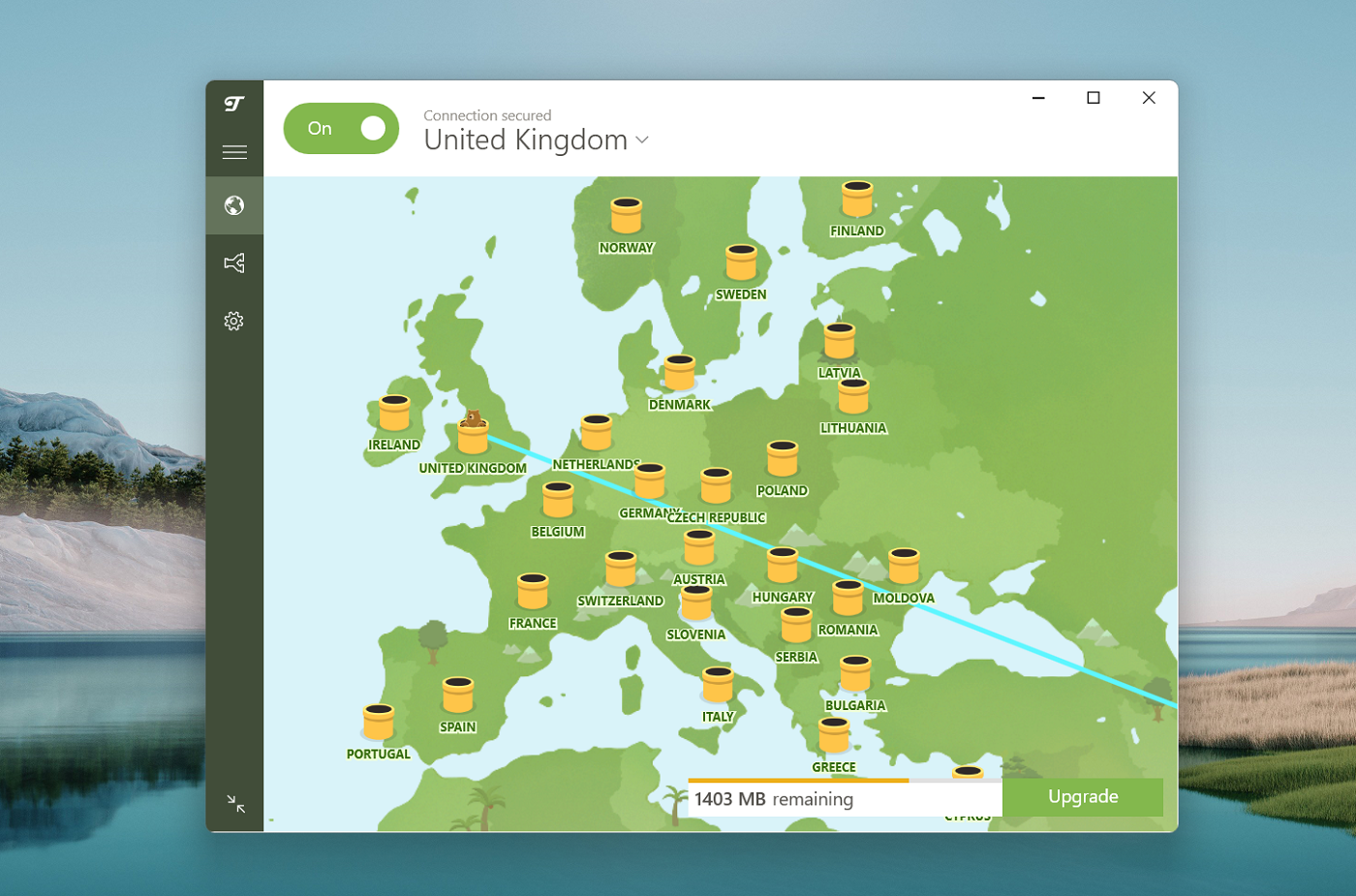
The bear theme is fun and foregoes the very technical approach that most security software usually have. If this is your first VPN, this whimsy user interface may make learning the software less confusing. The navigation experience itself is also very intuitive, with most features or options being placed where you’d expect them.
For users that are only starting to explore VPNs and want a less daunting experience, TunnelBear can be a good pick.
TunnelBear Teams
TunnelBear Teams (Figure C) is their version of team accounts for their VPN subscription. It nets users the paid service and additional features tailored to businesses, such as centralized team billing; the ability to add/remove users and edit billing info from an admin account; and an auto-join feature that automatically enrolls users with a specific email address.
Figure C
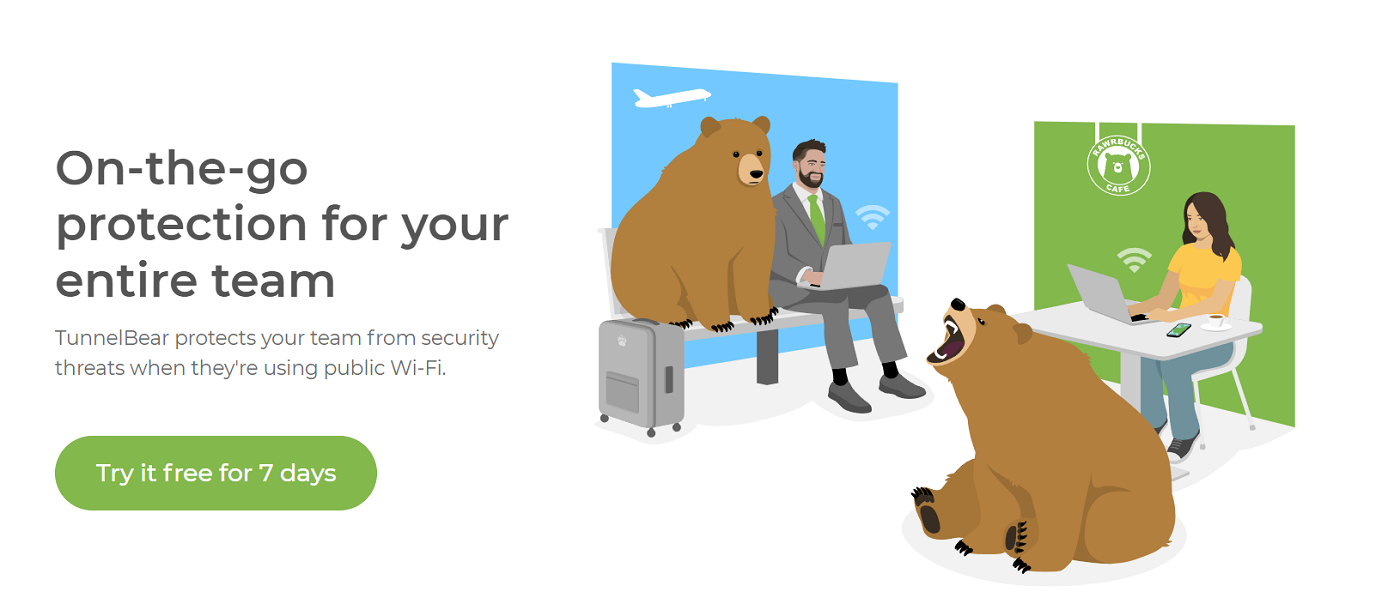
If you’re a small business thinking about getting a VPN for your workflow, TunnelBear Teams offers a convenient option that reduces a lot of legwork normally associated with setting up a VPN for an organization or business.
Unlimited device connections
TunnelBear VPN allows for an unlimited number of simultaneous device connections to one subscription. This means that any combination of computers, smartphones, or browsers can be protected via a TunnelBear server at no additional cost.
This is a meaningful feature given that some of the top VPN providers only offer around five to eight simultaneous connections with one account. The ability to connect an unlimited number of devices provides users with added value, eliminating the need to purchase additional connections.
Speed and performance: How fast is TunnelBear VPN?
Performance-wise, my experience with TunnelBear wasn’t great. During my first day of testing the VPN, I couldn’t establish a connection using TunnelBear’s “fastest” server connection option (Figure D). It was frustrating as the VPN was able to find the server closest to me — but was still not able to connect to it reliably.
Figure D
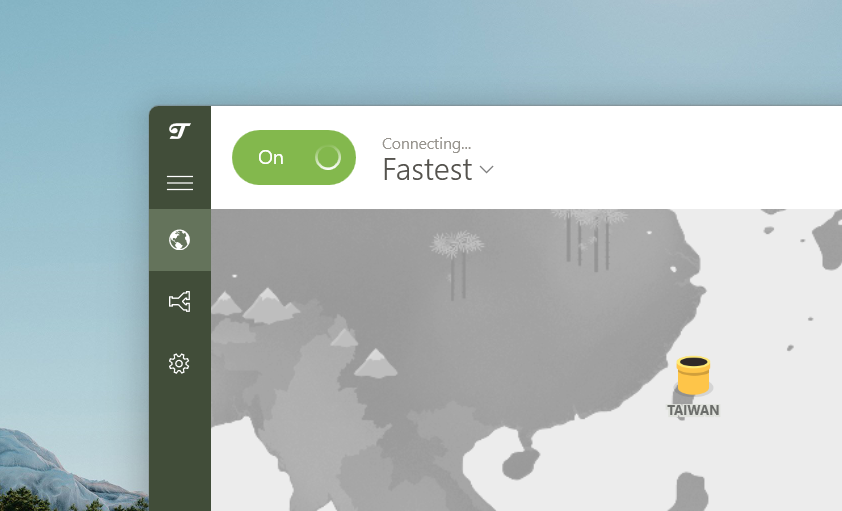
Even after I uninstalled and reinstalled the VPN, the issue remained. When I was able to connect, it took almost three minutes to do so; and when I disconnected, it was almost impossible to re-establish the connection. What’s weird is that when I connected to a server farther away from my location, I had no issues.
When I was connected, the speeds were slower compared to other VPNs. During my testing, I used TunnelBear mainly to do work in Google Workspace apps such as Drive and Docs, browse social media, and research with multiple tabs open. Webpages seemed to take a bit more time to load, and the connection was unstable. 1080p YouTube videos also had more buffering time than expected while connected to the VPN.
A day after my horrible experience with TunnelBear’s fastest server feature, the issue seemed to have resolved itself. I was able to connect to the server nearest to my location and disconnect/reconnect without any issue. The slower speeds, however, persisted even when the connection bug seemed to have been fixed.
SEE: How to use TunnelBear VPN (Step-by-Step Tutorial) (TechRepublic)
TunnelBear performed decently in terms of uploads and download speeds. In my speed test, TunnelBear had a decrease of 38.46% for downloads and 11.64% for uploads — with the upload speed being one of the faster speeds I’ve recorded compared to other VPNs.
TunnelBear also performed well on the DNS leak protection front. After multiple rounds of testing through a public DNS leak tool, I got zero leaks even while I used different locations.
Of course, VPN speed and performance will vary depending on factors such as your location, your internet service provider, server traffic, and your machine. However, my testing showed that TunnelBear may give you a buggy and slower experience compared to other VPN providers available today.
TunnelBear VPN servers and locations
TunnelBear offers around 5,000+ servers from 47 countries worldwide, putting TunnelBear’s server fleet in the low-to-middle range against the competition. In comparison, ExpressVPN offers servers from 105 countries, while Private Internet Access has servers across 91 countries.
While TunnelBear’s server count is on the higher end, I would prefer a more geographically diverse network. At 47 countries, TunnelBear has some catching up to do as other VPNs are offering around 60 to even 100+ countries in their server spread. So if you’re specifically looking for a VPN to unblock geo-restricted content, TunnelBear may not be the optimal choice.
I like that TunnelBear features P2P-friendly servers specifically optimized for tasks such as torrenting and file sharing.
TunnelBear VPN Customer service
Customer service (Figure E) is another aspect where TunnelBear could see some improvement. In particular, I believe TunnelBear should offer 24/7 live chat. Because VPNs can have unexpected technical issues, many of the top providers offer a service for answering questions and troubleshooting.
Figure E
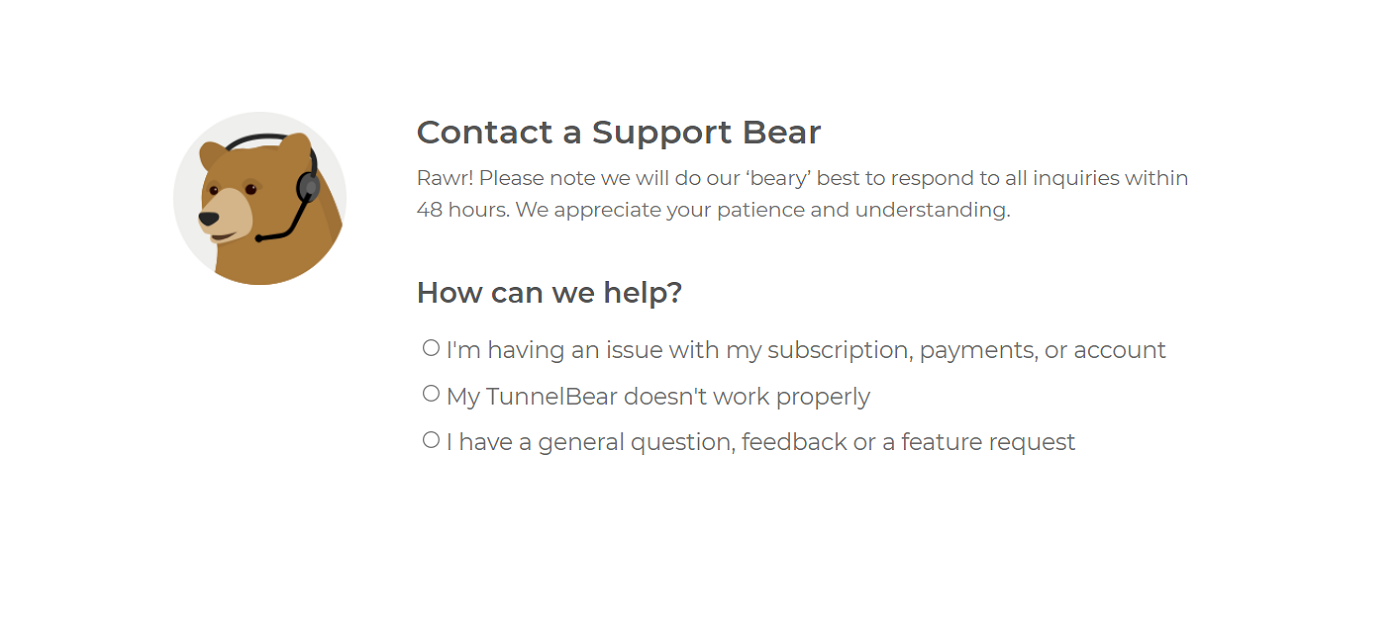
At the moment, TunnelBear has a web form and email, online guides, and an AI chatbot (Figure F) called RoboCub for customer support.
Figure F
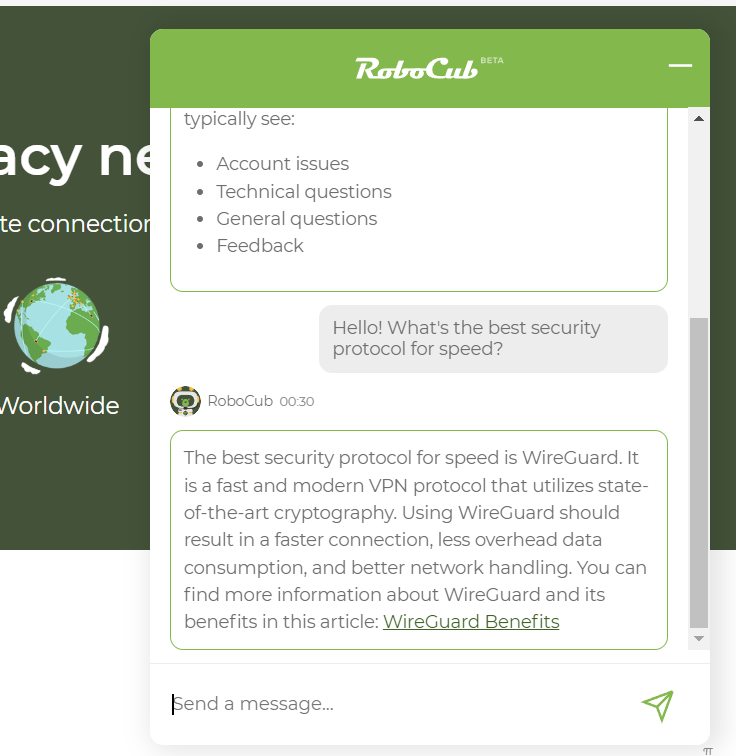
In fairness to TunnelBear, RoboCub was able to provide fairly helpful answers when I asked a few questions.
SEE: How to Create an Effective Cybersecurity Awareness Program (TechRepublic Premium)
TunnelBear VPN pros
- Beginner-friendly UI.
- Free version.
- Affordable one-year plan (fall sale).
- Annual independent audits.
- Unlimited device connections.
- TunnelBear Teams for businesses.
TunnelBear VPN cons
- Buggy app experience.
- Slow real-world speed.
- Connection can be unstable.
- Smaller country count for its servers.
- Hidden contract length options in pricing page.
ExpressVPN

If you’re looking for a VPN with an easy-to-use interface and fast performance, ExpressVPN is one of the best options on the market. It has strong security features, servers across 105 countries, and a password manager included at no additional cost.
To learn more, check our full ExpressVPN review.
Proton VPN

Proton VPN is a great pick if you’re looking for a VPN that operates in a privacy-friendly country. Based in Switzerland, it complies with the country’s strong privacy laws that offer an additional layer of security to your data. Proton VPN also has a free version with no data cap.
To find out more, check our full Proton VPN review.
Private Internet Access

Users who want a massive server suite should consider Private Internet Access VPN. PIA reportedly has around 10,000 to 35,000 servers across 91 counties, making it a smart choice if you plan to use a VPN to unblock content. Its Windows app is also one of the more customizable VPN applications available today.
To learn more, check our full Private Internet Access VPN review.
Review methodology
My review of TunnelBear VPN involved a detailed analysis of its security features, price, and real-world performance. I had hands-on experience with TunnelBear through its free Windows application, and I supplemented my findings with user testimonials and reputable reviews.
For download and upload speeds, I ran TunnelBear through Ookla’s public Speedtest. For DNS leak protection, I tested TunnelBear multiple times using DNSLeakTest.
Finally, I scored TunnelBear VPN on various elements, including its security protocols and price, based on an internal algorithm to get a rating of 3.1 out of 5 stars. I looked at TunnelBear VPN both on its own and in relation to other VPN solutions on the market today.


